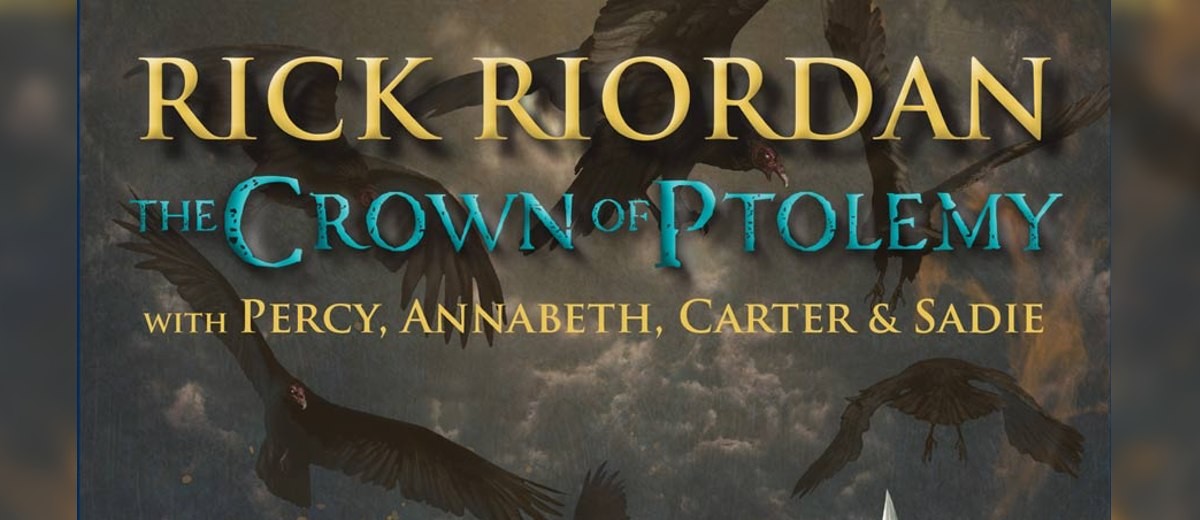Rick Riordan’s “The Crown of Ptolemy” Is a Satisfying Finale
Rick Riordan’s most recent short story, “The Crown of Ptolemy,” is the final of three Percy Jackson/Kane Chronicles crossovers. The last two, “The Son of Sobek” and “The Staff of Serapis,” involved a Percy/Carter meeting and an Annabeth/Sadie meeting, respectively. Now, the lauded modern mythology author has thrown all four teenagers into the mix for one final, epic, Egyptian/Greek mythology battle.
A Conclusion to a Greek/Egyptian Mythology Adventure
Some time has passed since the two meetings. But now the four demigods/magicians have to team up again because the evil Egyptian magician Setne is trying to harness the combined power of Ptolemy’s Greek and Egyptian myth magic. He is looking for the two parts to the Crown of Ptolemy, which, when united, will provide enough power for him to become a god. And of course, it’s up to Percy, Annabeth, Carter, and Sadie to save the day.
This final meeting of the four heroes provides a lot of opportunities for plot conclusion and character development. The short story only references the events of the recent books twice with a brief nod to the Apophis fight and a small reference to Gaea’s earth magic, but that’s just as well. It leaves more room for a good story to be successfully told and finished.
“The Crown of Ptolemy” is exciting for many reasons. One–the most significant one, in my mind–is that it is the first Rick Riordan story since the original Percy Jackson and the Olympians series to be told solely from Percy’s first-person point of view. The reader gets another chance to look into Percy’s lovable, snarky, and sarcastic mind again as the story unfolds. This naturally leads to Percy’s adorable thoughts about his relationship with Annabeth, including those about a potential for a family with her. We also get to see his thoughts regarding his rejection of the Greek gods’ offer of immortality and minor godhood in The Last Olympian, something that was all but ignored in The Heroes of Olympus. Setne attempts to use his decision to remain human and mortal against him, so Percy must figure out how to fight against this attack.
As the story involves the combination of the magic of two different mythologies, the four heroes end up joining and switching powers to fight Setne, to great effect. Percy uses an Egyptian wand transformed into a sword after Setne absorbs Percy’s sword Riptide (he doesn’t like that at all, but at least he gets it back) and even hosts an Egyptian god for a brief time. Carter uses Annabeth’s invisibility hat, which works again after the events of The Heroes of Olympus. Annabeth and Sadie trade ancient languages and use spells in Egyptian and Greek. The results are pretty awesome.
Personalities are compared, as well. Percy and Sadie both favor quick wit and quick action, while Carter and Annabeth favor knowledge and careful strategy. It is these thoughts on characterization that cause Percy to think that if he and Annabeth had a daughter, she would be a lot like Sadie Kane. Fun banter among the four moves the story forward, of course, along with the realization that they must compromise if they are to work together successfully. This issue of working together and not having a full, well-thought-out plan until halfway in allows Setne to gain the upper hand at first. Granted, the heroes never get mad at each other, but they fall victim to Setne’s M.O. of causing self-doubt, making them question decisions that they’ve made with their lives.
For those who are still a bit unfamiliar with the mythology involved or even with the series, Rick Riordan cleverly weaves it into dialogue and description, just as ever. From concise, informative explanations of ancient mythology to the witty modern commentary produced among the four, this story does its absolute best to make sure the reader doesn’t get lost. But no matter what ancient mythology Riordan chooses to incorporate, he continues to successfully adapt it to a modern world.
The Future of Riordan’s Stories
“The Crown of Ptolemy” ends with an acknowledgment of all that has happened, though I won’t give any spoilers. It also paves the way for more short stories, novels, and crossovers to come. Riordan obviously enjoys developing these characters, whom readers everywhere have come to love. Based on this story, I’m sure there is much more fun and storytelling ahead.
This story is a great ending to its trilogy, and I look forward to reading the next series that Riordan will be publishing, Magnus Chase and the Gods of Asgard.

